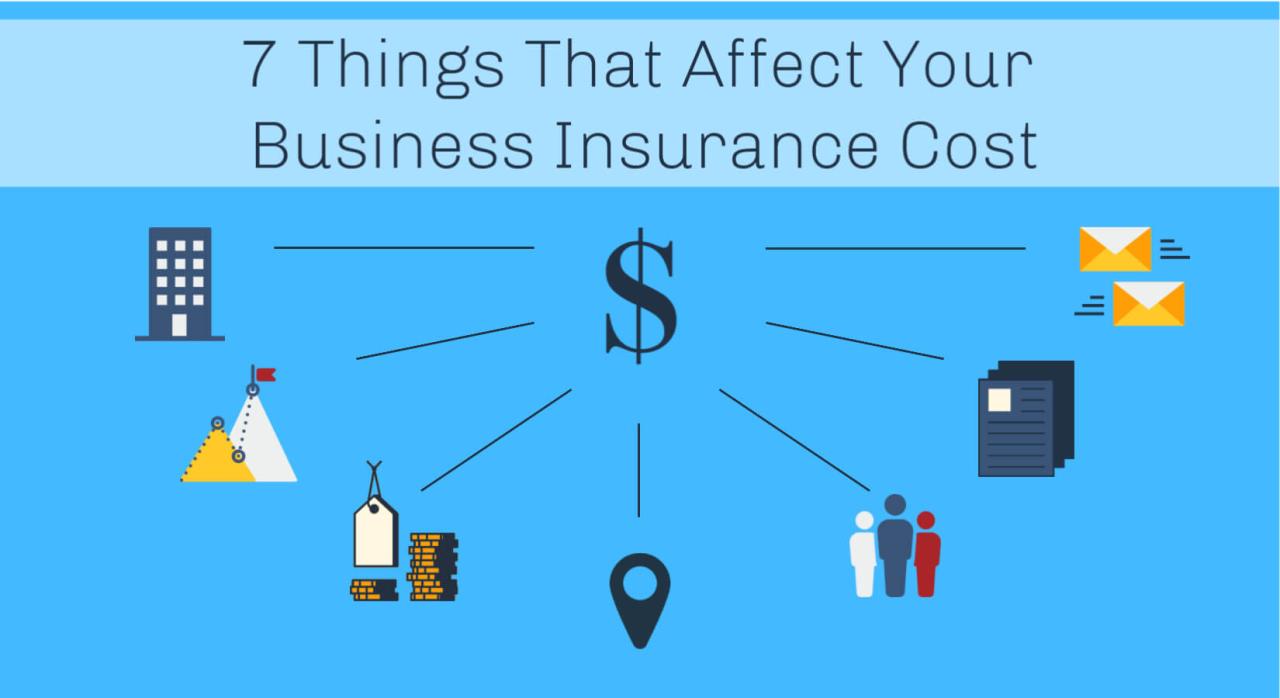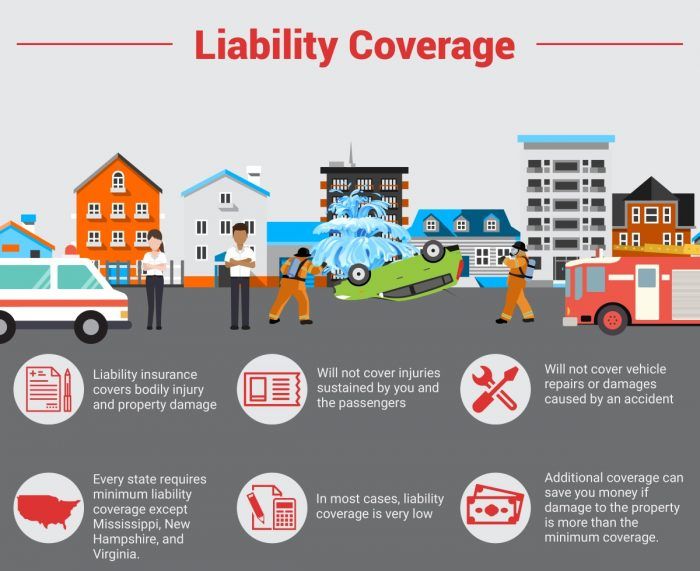How Much Does Business Insurance Cost for a One-Person LLC?
Exploring the costs of business insurance for a one-person LLC can shed light on crucial financial considerations for small business owners. This guide aims to unravel the complexities of insurance pricing, helping you navigate the landscape with confidence and clarity.
Delve into the intricacies of coverage options, premium factors, and strategic approaches to securing the right insurance at the right price.
Factors Influencing Business Insurance Cost
When determining the cost of business insurance for a one-person LLC, several factors come into play. Understanding these factors can help you estimate and manage your insurance expenses effectively.
Types of Insurance Coverage Needed
- General Liability Insurance: Protects against claims of bodily injury, property damage, and advertising injury.
- Professional Liability Insurance: Covers errors, negligence, or malpractice in services provided.
- Business Property Insurance: Safeguards business property and equipment against damage or loss.
Nature of the Business
The nature of your business activities can significantly impact insurance costs. For example, a one-person LLC operating in a high-risk industry, such as construction or healthcare, may face higher premiums due to increased exposure to potential risks.
Location of the Business
- Urban vs. Rural Areas: Businesses located in urban areas may face higher insurance costs due to higher crime rates and greater exposure to potential liabilities.
- State Regulations: Insurance regulations and requirements vary by state, impacting premium rates. For instance, states prone to natural disasters may have higher property insurance premiums.
Calculating Insurance Costs

When it comes to determining insurance costs for a one-person LLC, there are several factors to consider. Understanding the breakdown of typical costs associated with business insurance, as well as how coverage limits and deductibles impact pricing, is crucial for making informed decisions.
Additionally, comparing the costs of liability insurance versus property insurance can help you tailor your coverage to suit your specific needs and budget.
Breakdown of Typical Costs
- General Liability Insurance: This type of insurance covers claims related to bodily injury, property damage, and advertising injury. Costs can vary based on the nature of your business and coverage limits.
- Professional Liability Insurance: Also known as errors and omissions insurance, this coverage protects against claims of negligence or inadequate work. Costs depend on the level of risk associated with your profession.
- Property Insurance: This insurance covers damage to your business property, such as equipment, inventory, and furniture. Premiums are influenced by the value of your assets and the level of coverage needed.
- Business Interruption Insurance: In the event of a covered loss that forces your business to close temporarily, this insurance can help cover ongoing expenses. Costs are determined by the potential revenue loss and the length of coverage needed.
Coverage Limits and Deductibles
- Coverage Limits: Higher coverage limits typically result in higher premiums, as the insurance company assumes more risk. It's important to strike a balance between adequate coverage and affordability.
- Deductibles: Choosing a higher deductible can lower your premiums, but it also means you'll pay more out of pocket in the event of a claim. Consider your financial situation and risk tolerance when selecting a deductible.
Liability Insurance vs. Property Insurance
- Liability Insurance: Generally, liability insurance tends to be more expensive than property insurance for a one-person LLC. This is because liability claims can result in significant financial losses and legal expenses.
- Property Insurance: While property insurance costs may vary based on the value of your assets and the level of coverage, it is typically more affordable than liability insurance. However, it is essential for protecting your business property from unforeseen events.
Shopping for Insurance
When shopping for insurance for your one-person LLC, it's essential to have a clear strategy in place to compare quotes from different providers. This will help you make an informed decision and find the best coverage at a reasonable cost.
Comparing Quotes
- Research Multiple Providers: Start by researching and identifying several insurance providers that offer coverage for one-person LLCs.
- Request Quotes: Reach out to each provider and request detailed quotes based on the specific needs of your business.
- Compare Coverage: Review each quote carefully to understand the coverage offered, including limits, deductibles, and any additional benefits.
- Consider Premiums: Compare the premiums quoted by each provider, keeping in mind that the cheapest option may not always offer the best coverage.
Obtaining Accurate Quotes
- Provide Detailed Information: Be prepared to provide detailed information about your business, including revenue, industry, location, and any previous insurance claims.
- Ask Questions: Don't hesitate to ask questions about the coverage provided, any exclusions, and the claims process to ensure you have a clear understanding.
- Review Policy Terms: Carefully review the terms of each policy to ensure you are getting the coverage you need without any surprises.
Negotiating Premiums
- Bundle Policies: Consider bundling multiple types of insurance, such as general liability and property coverage, to potentially receive a discount on premiums.
- Increase Deductibles: Opting for a higher deductible can lower your premiums, but make sure you can afford the out-of-pocket costs in case of a claim.
- Show a Good Track Record: If your business has a history of few or no insurance claims, highlight this when negotiating with insurers to potentially lower your premiums.
Understanding Policy Options
When considering insurance options for a one-person LLC, understanding the differences between general liability insurance and professional liability insurance is crucial. Additionally, knowing the significance of errors and omissions (E&O) insurance, as well as other potential coverage options, can help protect your business effectively.
General Liability Insurance vs. Professional Liability Insurance
- General liability insurance typically covers claims related to bodily injury, property damage, and advertising injury. It protects your business from common risks that may arise in day-to-day operations.
- Professional liability insurance, also known as errors and omissions (E&O) insurance, is more specific to professional services. It covers claims of negligence, errors, or omissions that may occur while providing services to clients.
- While general liability insurance is essential for basic protection, professional liability insurance is crucial for service-based businesses, including one-person LLCs, to safeguard against potential lawsuits arising from professional errors.
Significance of Errors and Omissions (E&O) Insurance
- Errors and omissions (E&O) insurance provides coverage for claims related to professional mistakes, negligence, or failure to perform services adequately. It protects your business from financial losses resulting from lawsuits filed by dissatisfied clients.
- For a one-person LLC involved in professional services, such as consulting, design, or other specialized work, E&O insurance is vital to mitigate the risks associated with potential errors in service delivery.
- Having E&O insurance can help maintain your business's reputation and credibility by demonstrating your commitment to quality and accountability in your work.
Additional Insurance Coverage for a One-Person LLC
- Business Owner's Policy (BOP): Combines general liability and property insurance into a cost-effective package, offering comprehensive coverage for common risks faced by small businesses.
- Cyber Liability Insurance: Protects against data breaches, cyber-attacks, and other online risks that may compromise sensitive information or disrupt business operations.
- Commercial Auto Insurance: Covers vehicles used for business purposes, providing protection in case of accidents, theft, or damage while on the road.
- Workers' Compensation Insurance: Mandatory in most states for businesses with employees, offering coverage for medical expenses and lost wages in case of work-related injuries or illnesses.
Final Conclusion
In conclusion, understanding the nuances of business insurance costs for a one-person LLC empowers entrepreneurs to make informed decisions that safeguard their ventures. By grasping the key elements Artikeld here, you can embark on your insurance journey with knowledge and insight.
Quick FAQs
What types of insurance coverage are needed for a one-person LLC?
For a one-person LLC, essential insurance coverage includes general liability, professional liability, and possibly property insurance depending on the nature of the business.
How do coverage limits and deductibles affect insurance pricing for a one-person LLC?
Higher coverage limits and lower deductibles typically lead to higher insurance premiums, while lower coverage limits and higher deductibles can lower costs but may increase financial risk in case of claims.
What are some tips for negotiating premiums with insurance companies for a one-person LLC?
To negotiate premiums, consider bundling policies, maintaining a good credit score, and highlighting risk mitigation strategies to insurers. Additionally, shopping around for quotes can provide leverage in negotiations.
What is the significance of errors and omissions (E&O) insurance for a one-person LLC?
E&O insurance protects businesses against claims of inadequate work or negligent actions. For a one-person LLC, this coverage can be crucial in safeguarding against professional liability risks.
What additional insurance coverage might be beneficial for a one-person LLC?
Depending on the industry and specific risks involved, additional coverage such as cyber liability insurance, business interruption insurance, or commercial auto insurance could be beneficial for a one-person LLC.




